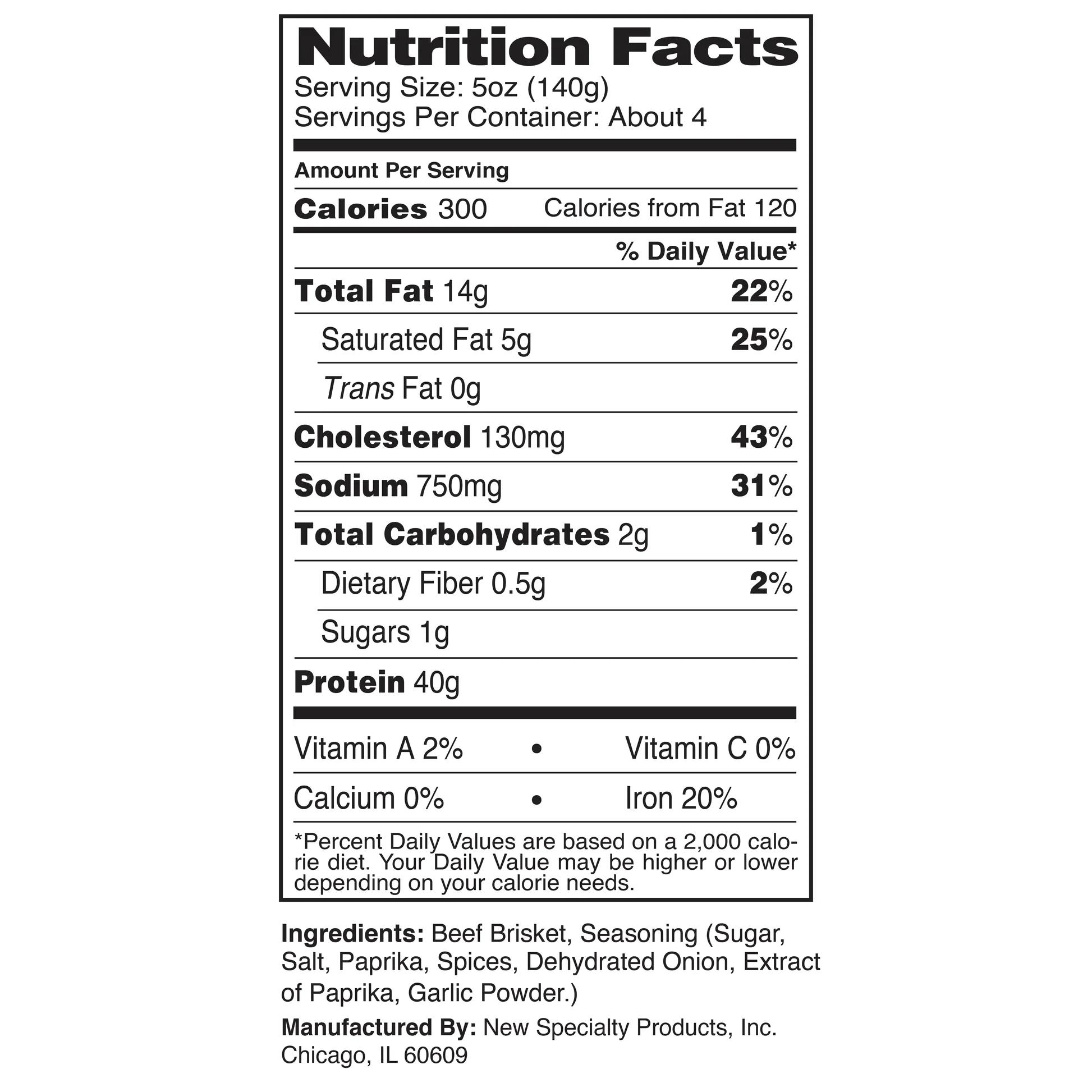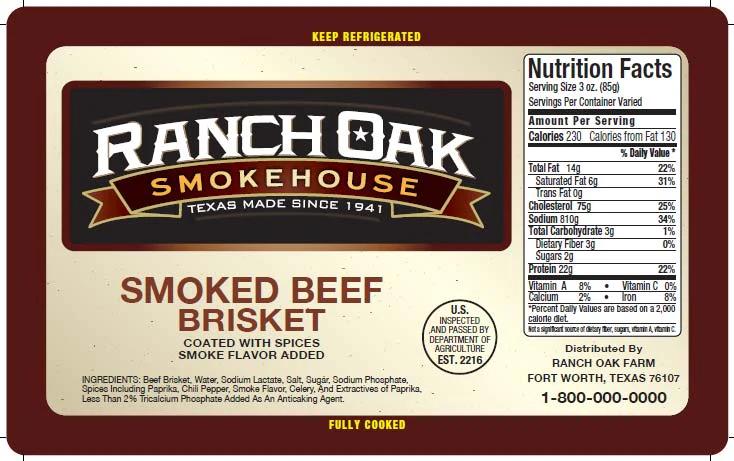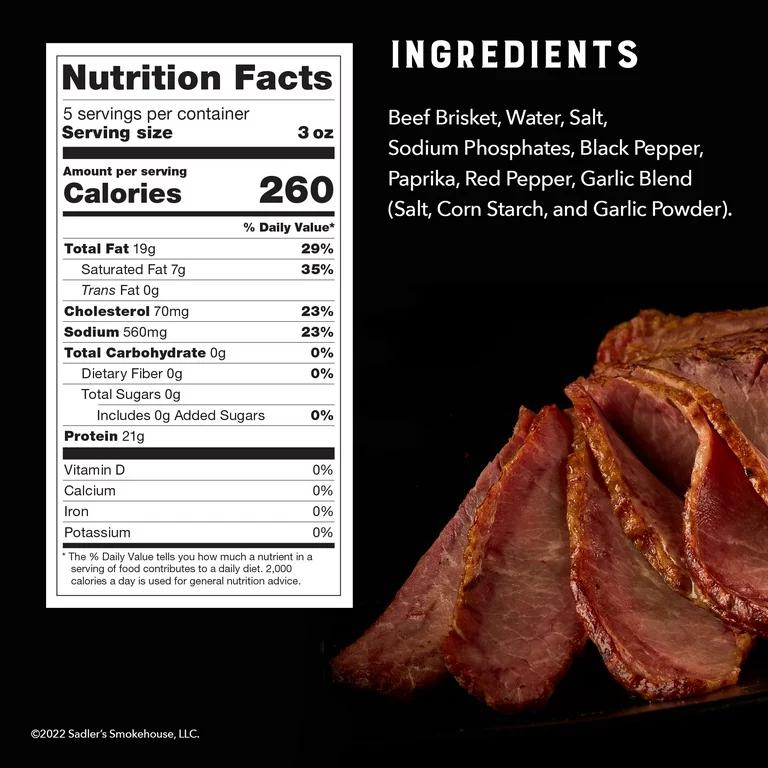When it comes to smoked meats, beef brisket is a popular choice among meat lovers. Not only does it offer a delicious flavor and tender texture, but it also provides essential nutrients that are beneficial for your overall health. In this article, we will explore the nutritional value of smoked beef brisket and discuss its protein content, fat content, and carbohydrate content.
Is Beef Brisket High in Protein?
Protein is an essential macronutrient that plays a crucial role in building and repairing tissues, supporting immune function, and aiding in various metabolic processes. Beef brisket is indeed high in protein, making it an excellent choice for individuals looking to meet their protein needs.
According to Health Canada guidelines, a cooked piece of beef brisket weighing around 100 grams contains approximately 29 grams of protein. This amount is equivalent to about 3 eggs, 1 chicken breast, or 8 cups (502 grams) of black beans.
Protein is composed of amino acids, and beef brisket provides all the essential amino acids that your body needs. Essential amino acids cannot be produced by the body, so it is important to obtain them from your diet. These amino acids are critical for protein synthesis and play a crucial role in various physiological processes.
Leucine is one of the essential amino acids found in beef brisket. It is known to stimulate muscle protein synthesis and is particularly beneficial for muscle growth and recovery. Other good sources of leucine include soy, hemp, meat, nuts, fish, and legumes.
It is worth noting that the protein quality score of beef brisket is 100%, indicating that it provides all the essential amino acids in the right proportions. This makes it an excellent choice for individuals looking to meet their protein needs.
Macronutrient Profile of Smoked Beef Brisket
Aside from its protein content, smoked beef brisket also contains fats and carbohydrates. Let's take a closer look at its macronutrient profile:
Protein
Beef brisket is a high-protein food, with approximately 29 grams of protein per 100-gram serving. This makes it an excellent choice for individuals who follow a high-protein diet or engage in regular exercise and physical activity.
Protein is essential for muscle growth, repair, and maintenance. It also helps to keep you feeling full and satisfied, making it beneficial for weight management.
Carbohydrates
When it comes to carbohydrates, smoked beef brisket is virtually carb-free. It contains zero carbohydrates, which makes it an ideal choice for individuals following a low-carb or ketogenic diet.
Carbohydrates are the body's primary source of energy, but it is not necessary to consume high amounts of carbs if you are not engaging in intense physical activity or have specific dietary requirements.
Fat
Smoked beef brisket contains fats, particularly saturated fat. Saturated fat is often associated with raising LDL ( bad ) cholesterol levels, so it is important to consume it in moderation.
While saturated fat can be part of a healthy diet, it is recommended to limit its intake to maintain heart health. Opting for leaner cuts of beef brisket or trimming the excess fat can help reduce the saturated fat content.
Additionally, smoked beef brisket contains zero trans fats, which are known to increase the risk of heart disease. Trans fats should be avoided as much as possible.
It is worth noting that beef brisket is also high in cholesterol. While dietary cholesterol does not have a significant impact on blood cholesterol levels for most individuals, it is still recommended to consume cholesterol-rich foods in moderation, especially if you have specific dietary restrictions or health conditions.
The Nutritional Benefits of Smoked Beef Brisket
In addition to its macronutrient profile, smoked beef brisket offers several nutritional benefits. Here are some of the key nutrients found in beef brisket:
- Vitamin B12: Beef brisket is an excellent source of vitamin B12, which is essential for red blood cell production, nerve function, and DNA synthesis.
- Zinc: Zinc is important for immune function, wound healing, and protein synthesis. Beef brisket is a good source of this essential mineral.
- Selenium: Smoked beef brisket contains selenium, a powerful antioxidant that plays a role in immune function and thyroid health.
- Iron: Iron is necessary for the production of hemoglobin, which carries oxygen throughout the body. Beef brisket provides a good amount of iron.
These nutrients are vital for overall health and well-being. Including smoked beef brisket as part of a balanced diet can help ensure that you are getting these essential nutrients.

Is smoked beef brisket a healthy choice?
Smoked beef brisket can be a healthy choice when consumed in moderation and as part of a balanced diet. It is a good source of protein and essential nutrients, but it is important to consider the fat content and choose leaner cuts whenever possible.
Can smoked beef brisket be part of a weight loss diet?
Smoked beef brisket can be included in a weight loss diet, especially if you are following a high-protein or low-carb approach. However, it is important to be mindful of portion sizes and choose leaner cuts to reduce the overall calorie and fat intake.

How should smoked beef brisket be prepared?
Smoked beef brisket is typically prepared by slow-cooking the meat over low heat for several hours. This cooking method helps to tenderize the meat and infuse it with smoky flavor. It is important to monitor the internal temperature of the brisket to ensure it is cooked to a safe temperature.
What are some healthy side dishes to serve with smoked beef brisket?
When serving smoked beef brisket, you can pair it with a variety of healthy side dishes. Some options include roasted vegetables, steamed greens, salad, coleslaw, or grilled corn on the cob. These side dishes can add nutritional value and balance to your meal.
Smoked beef brisket is not only a tasty option for meat lovers but also provides essential nutrients. It is high in protein, making it an excellent choice for individuals looking to meet their protein needs. While it does contain fats, it is important to choose leaner cuts and consume them in moderation. Additionally, smoked beef brisket offers several key nutrients that are beneficial for overall health. Including smoked beef brisket as part of a balanced diet can help you enjoy its delicious flavor while reaping its nutritional benefits.
If you want to know other articles similar to Smoked beef brisket nutrition: a complete guide you can visit the Nutrition category.


Related Articles